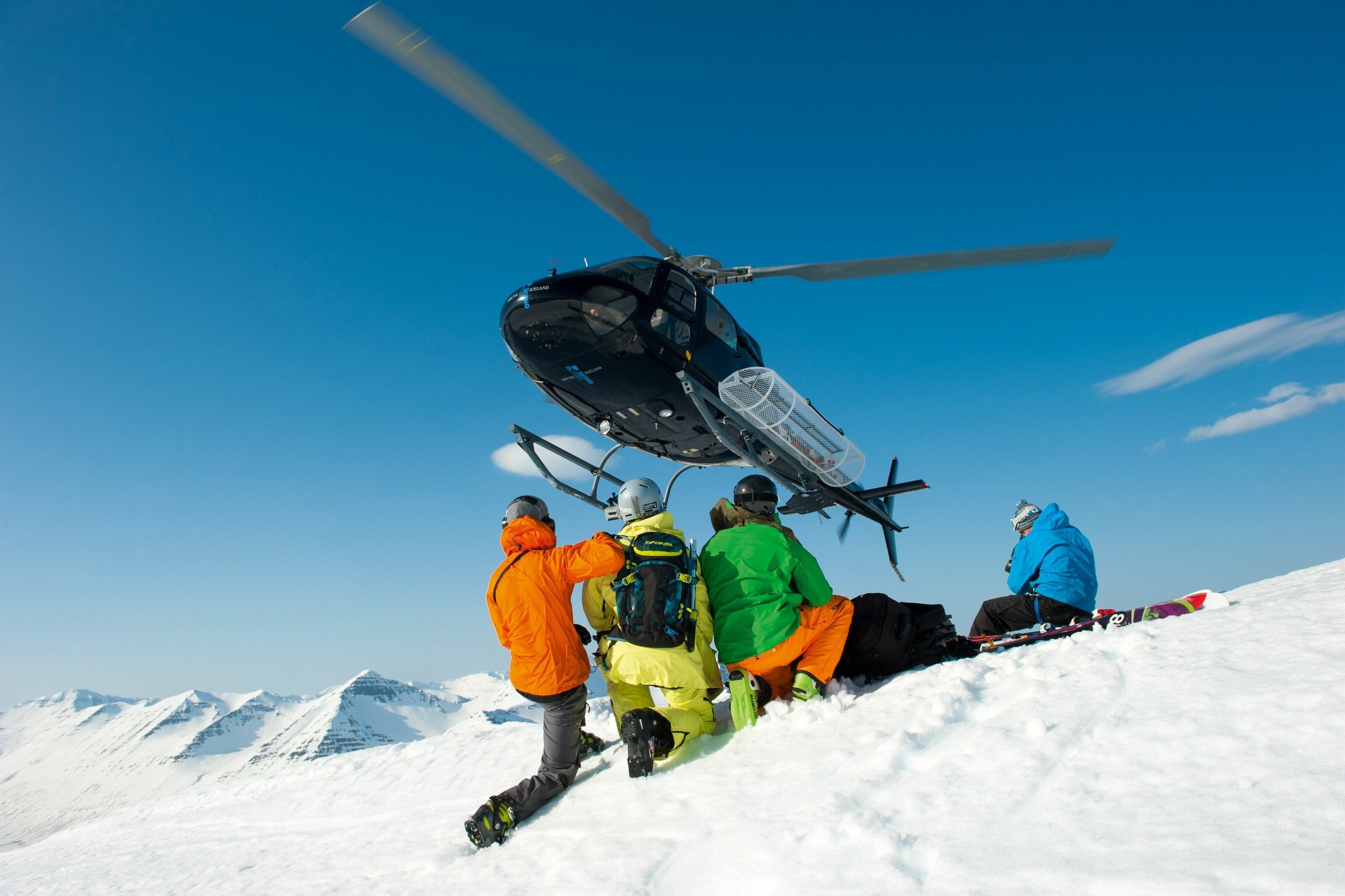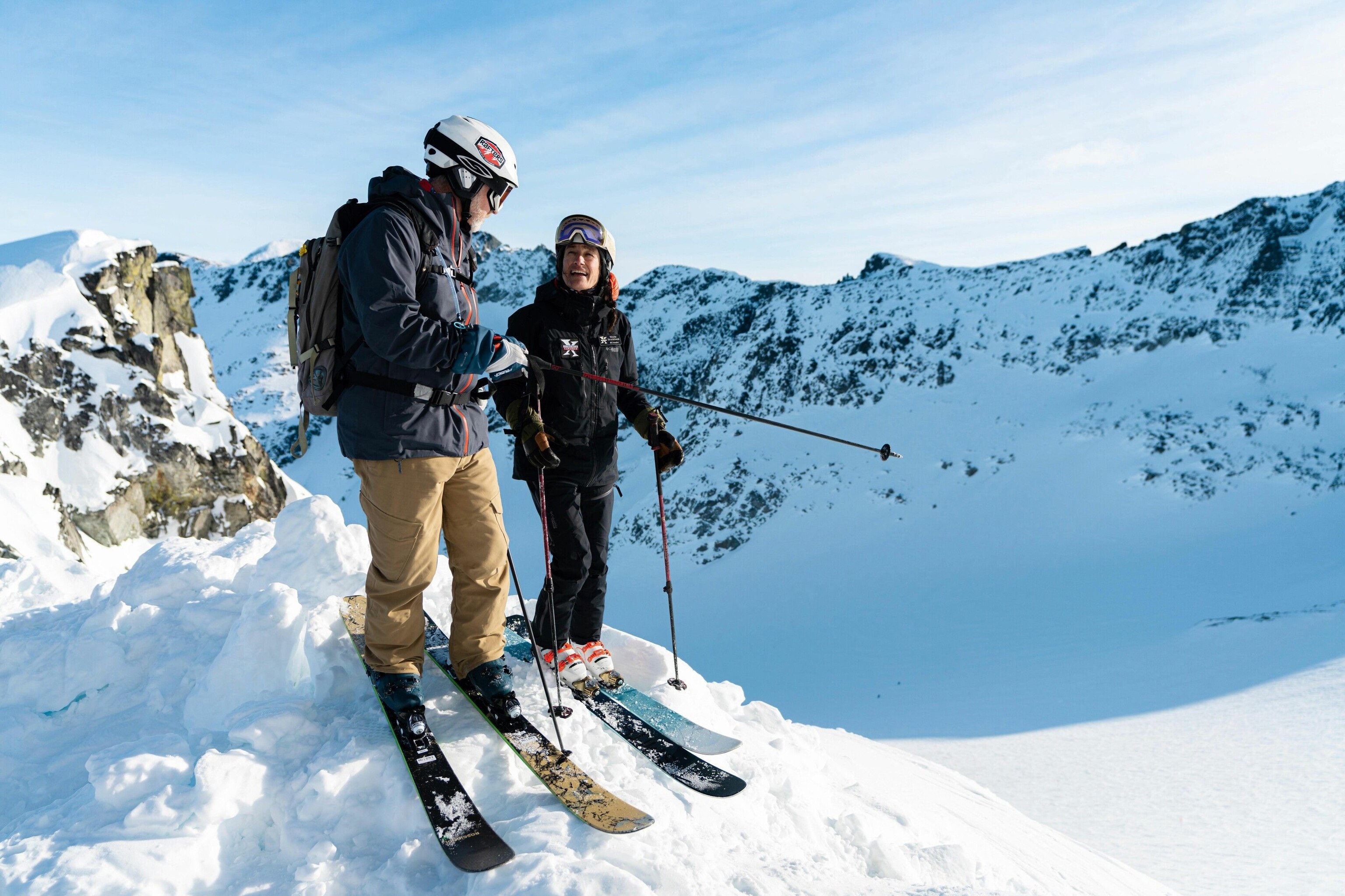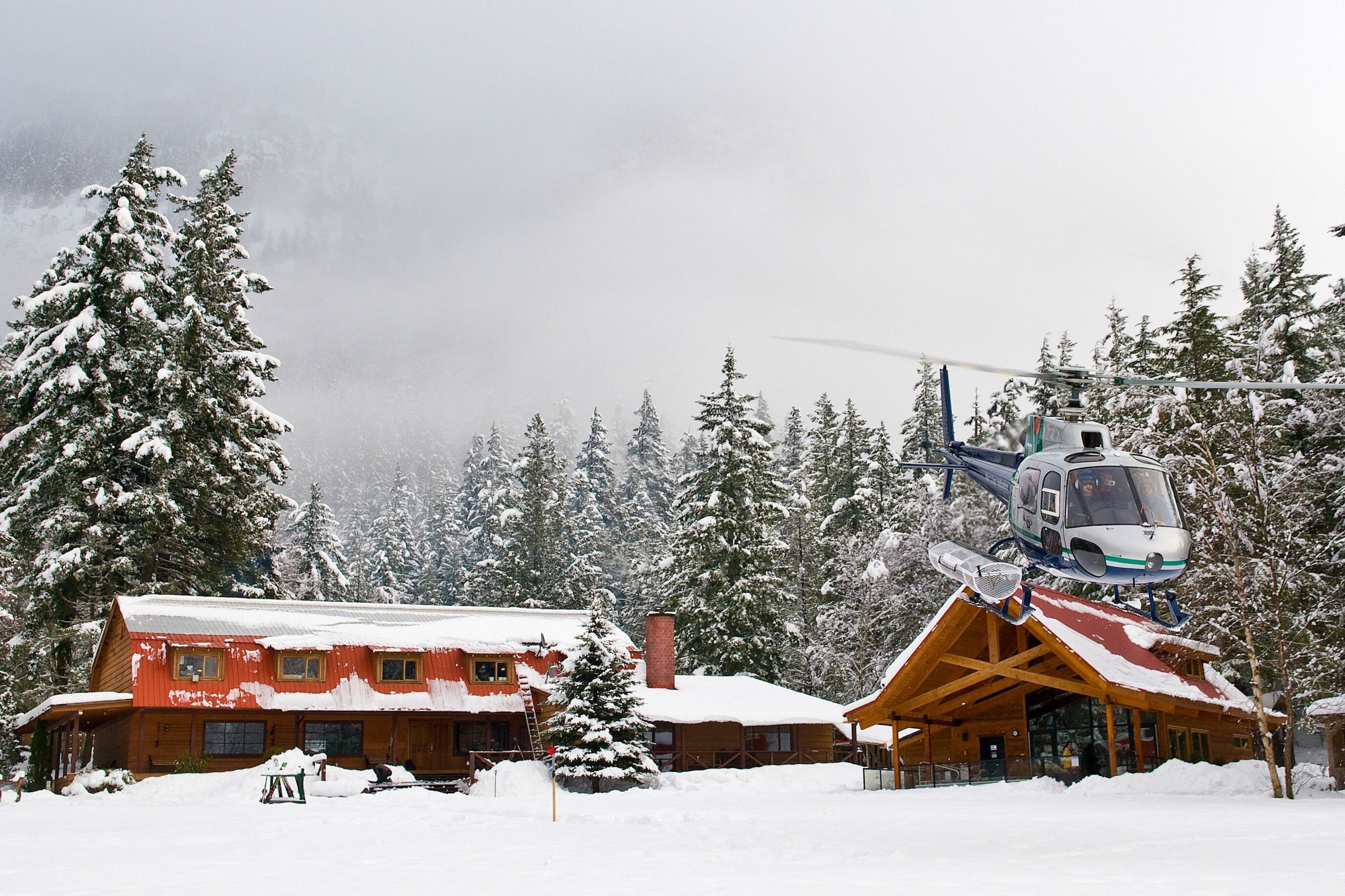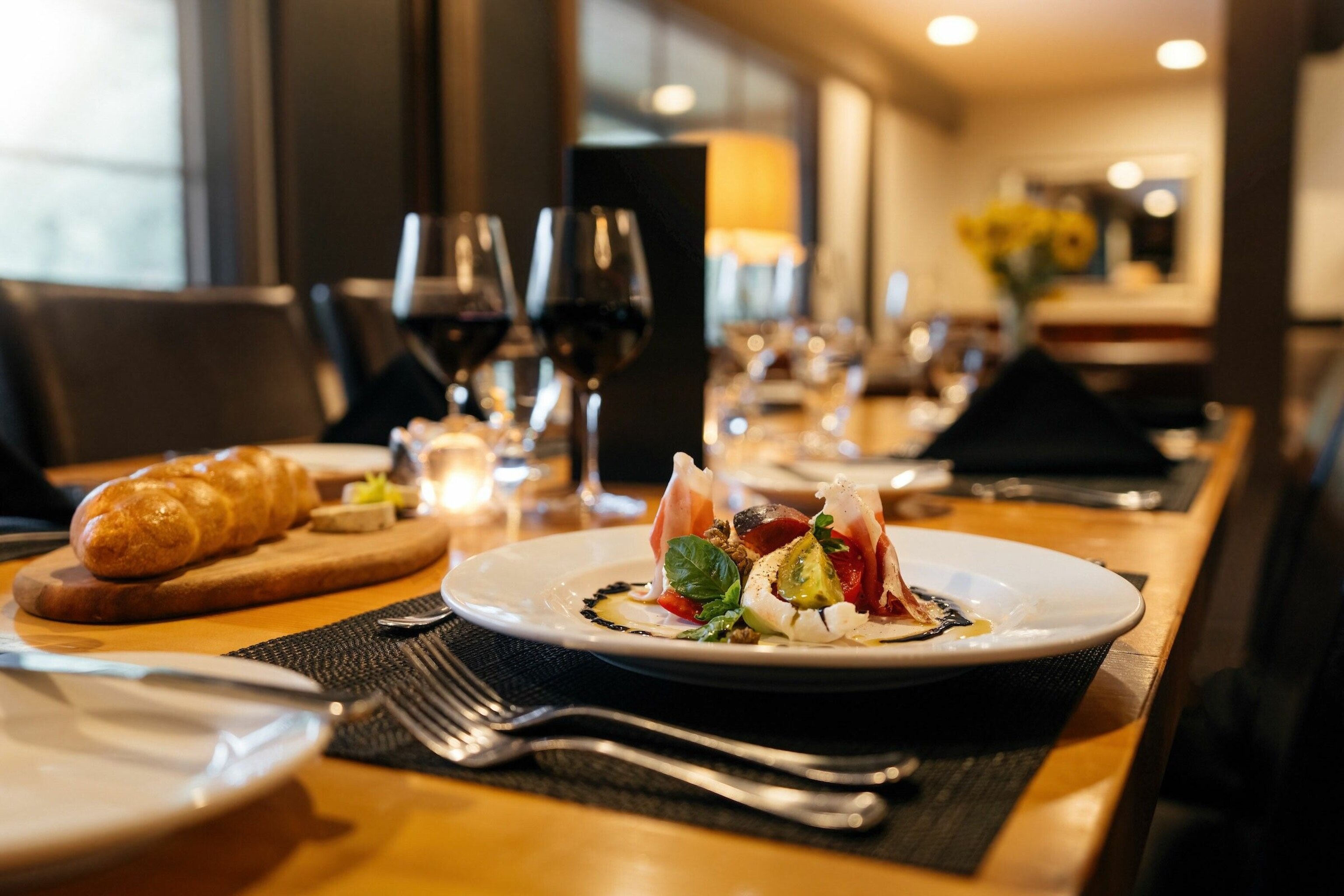
Exploring wild ski terrain in Canada's Bella Coola Valley
The remote Bella Coola valley in the British Columbia back country is home to some of Canada's wildest mountain terrain. Slopes are accessible largely by helicopter; giving strong skiers the descents of a lifetime.
“That was a first descent, mate!” announced our ski guide Pat Delaney with a wide grin: cue whoops and high fives all round after all, how often does a regular skier get to make a first descent? Carving down a ‘first descent’ on a never before-skied mountainside is exactly what you’d hope for from a heli-ski adventure.
Ours has begun with our skilled helicopter pilot Loran dropping us on a knife-edge ridge with the rear end of the aircraft hanging over a sheer drop. Scrabbling out onto the safe side of said drop into a blizzard of snow thrown up by the machine’s madly whirring rotor blades, we find ourselves on a snowbound saddle between Mount Fyles and Mongol Mountain in British Columbia’s Coastal Range.
After the helicopter has clattered off to wait for us on the Monarch Icefield 2,625 feet below, we’re left to take in a landscape that is truly otherworldly huge black crags and peaks thrusting up like mighty fangs above endless, blinding white glaciers, sparkling turquoise blue ice falls tumbling down their slopes and a total silence broken only by the occasional sough of an alpine breeze.

Clipping into our fat powder skis and donning our avalanche packs, we follow Pat as he traverses beneath Mongol Mountain’s south summit ready to descend the glacier flowing down its flanks. The slope is excitingly steep at first (Pat estimates around 38-40 degrees), and we spread out so each skier can draw their own line in the wide, open snowfield; I stay at the back, happy to let everyone disappear from sight so I can savour the sense of being totally alone in one of the wildest, most primeval environments I’ve ever encountered.
The afternoon sun has warmed the slope. As I set off downhill my skis slice through butter-soft ‘corn snow’ (so-named for the granular quality that happens to snow when it becomes soft and forgiving, but not too wet and slushy). The turns are easy, so there’s ample opportunity to glance across to my left at glinting blue seracs where the glacier spills over a steeper section of the slope.

It’s impossible to resist a holler of sheer elation. Eventually the angle of the slope lessens, and we all came to a halt beside Pat, which is when we discover that, to his knowledge, this is the first time the slope has ever been skied.
As Wikipedia points out with a certain degree of understatement, “the Monarch Icefield is very remote and is rarely visited.” Unless you have a helicopter, this is essentially inaccessible terrain; indeed, many of the mountain peaks surrounding our anonymous slope are similarly yet to be named. We christen the ‘run with no name’ over beers at our rustic-luxe ski base, Tweedsmuir Park Lodge, a former hunting and fishing lodge deep in the Great Bear Rainforest, safe in the knowledge that for your average experienced skier this is as good as it gets.

Glaciers, couloirs & hidden valleys
Our first descent is just one of the innumerable highlights of a trip to Bella Coola, a valley deep in British Columbia’s wilderness, some 100 miles from Central Coast. Organised by tailor-made tour operator Mabey Ski, my trip starts with a two-day ‘Steep and Deep’ camp in Whistler, getting my rusty legs and technique in shape. According to company founder, Nickie Mabey, the programme was created “to give guests the opportunity to fine-tune their powder skiing before jumping straight into a heli-skiing week”. And I’m glad of it, not least since it helps build my confidence before tackling some of the most exciting skiing of my life.
Bella Coola Heli Sports, the local operator facilitating our high-flying adventures, has been voted the ‘World’s Best Heli Ski Operation’ at the World Ski Awards five years in a row thanks to a winning combination of superb guiding, luxurious ski lodges, plus the biggest heli-ski terrain on the planet (3.55 million acres: about the same size as the entire Swiss Alps). This doesn’t come cheap, but for adventurous experienced skiers it’s the ultimate trip.

It’s not just the incredible terrain, which varies from high altitude glaciers and steep couloirs to forest glades and hidden valleys, nor the vast quantities of snowfall (an average of 65 to 100 feet per season) that make Bella Coola so special. There’s also the snow, which goes out of its way to be user-friendly, having a consistency that allows it to ‘stick’ to steeper slopes and reduce the risk of avalanches. And with such a vast ski area it’s a given that our group of five four skiers and one guide will enjoy fresh tracks on every single run.
Trips are led by guides who are exceptional in their ability to find the best snow whatever the weather conditions. Head guide Woody Tribe has been skiing these mountains for 30 years and has made and named hundreds of first descents. There are more than 1,200 runs within Bella Coola’s ski area to date, but Woody reckons there are hundreds more to be discovered in what he calls “exploratory heli-skiing”.

A measured and unhurried approach to skiing is common to all the guides at Bella Coola, which helps ease the pressure that’s invariably felt by most people when heli-skiing the excitement of flying over primordial mountain-scapes in a helicopter is almost overwhelming, and the adrenaline levels only climb higher as you clamber out of the machine to experience this wilderness on skis.
The skiing, of course, is unparalleled but the journey to get to Bella Coola’s pristine ski slopes is a major part of the experience; from taking off just 165 feet from Tweedsmuir Park Lodge to swooping over deep forests, skimming past towering rock faces and soaring above immense glaciers that may never have been trodden on, let alone skied on, before. It’s literally thrill-a-minute stuff, and the skill of the pilots in negotiating this wild terrain with its unexpected updrafts and unpredictable mountain winds is remarkable.
Awe, it seems, across the board is the Bella Coola way. At each day’s end, we gather around Tweedsmuir’s wood burner to rest aching muscles, replete with the lodge’s nutrient packed fine dining, sourced from local farms and Pacific coast producers. Faces awestruck and sunburnt, we can barely wait to get out there the next morning and do it all again.

How to do it
Mabey Ski offers trips to Bella Coola from C$16,800 per person (£11,200). This is based on two sharing hotel accommodation, including four nights B&B at the Fairmont Chateau hotel in Whistler and the three day Whistler Steep and Deep camp with lift pass, five nights/four days heli-skiing from Tweedsmuir Park Lodge or Eagle Lodge with all meals, rental of powder skis/snowboard, avalanche safety equipment and guiding, all transfers between Whistler and Vancouver and return flights to Bella Coola. Flights to British Columbia are not included.
Published in the Winter Sports 2022/23 guide, distributed with the December 2022 issue of National Geographic Traveller (UK)
Follow us on social media
Twitter | Facebook | Instagram